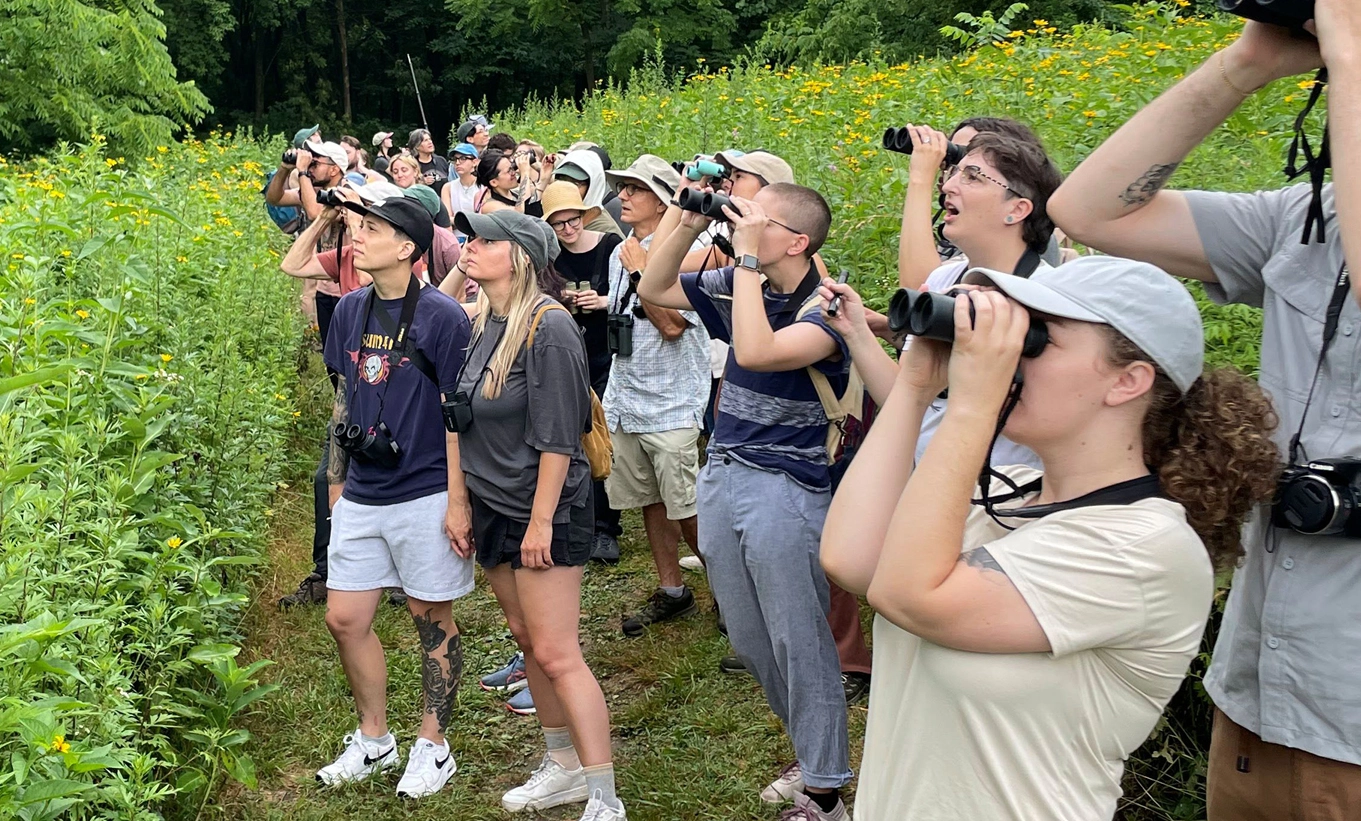Home

LGBTQIA+ Birding Groups Find Their Perch
by Sarah Marley, Friends of the Wissahickon Executive Director
Happy Pride! To celebrate this special month, Friends of the Wissahickon is proud to partner with Philly Queer Birders for a birding hike on Jun. 29. Register at fow.org/events/.
We’ll meander along Forbidden Drive and spot some of our year-round favorites: cardinals, blue jays, red-tailed hawks, tree swallows, great blue herons, wood ducks, eagles and more.
One of the best parts of birding is sharing it with other like-minded members of the birding community. Unfortunately, not everyone is afforded the same standard of safety and accessibility to enjoy nature. Thanks to groups like PBQ, members and allies of the LGBTQIA+ community have a place that is welcoming of all queer identities, where they can hone their birding skills and share “bird joy” with their community.
Ahead of our walk, we sat down with the founder of PBQ, Elise Greenberg, to learn more about their organization.
How did PBQ come to be?
I started PBQ in March of 2021, at the height of the pandemic. I was getting more serious about birding and was lacking community — queer community in particular — because of all the restrictions. Fifteen people showed up for our first meet up, which is wild.
[Creating PBQ] was really about wanting to surround myself with queer community in a safe way in nature and share in this newish hobby, which was bringing me a lot of joy. Also, I wanted to create safe spaces that were physically safe in a pandemic sense as well as inclusive.What is PBQ’s mission and who does it serve?
Our mission is to welcome queer birders and allies of all birding abilities to explore Philly’s green spaces and enjoy birds together while creating and fostering queer community. We’re not exclusive to people who identify as queer; we are open to anyone who is an ally or is unsure of their identity.
What sort of challenges do queer people face when enjoying the outdoors and where do groups like PBQ come in?
It’s a question that comes up for people a lot, like ‘why do you need that [queer spaces and groups]?’ People might not feel they can be their full selves in a group that they don’t know is explicitly welcoming of queer identities.
If someone is in a visibly queer relationship, they might not feel comfortable holding hands with their partner, for instance. But in a queer group, they might be more comfortable doing that.
Also, some don’t know a lot about birding, so our group seeks to make every walk beginner friendly. We always go over how to use binoculars and point out common birds.
Queer people often want to surround themselves in queer community, and you can do that in nature. The political landscape now makes all of this even more important.
What’s your favorite part of running PBQ and your favorite part of birding?
When you get on a bird and everyone audibly gasps and cheers; it doesn’t matter what kind of bird it is. We’ve seen male cardinals that are gorgeous, and everyone gets so excited.
I love seeing people come back and seeing folks who have never birded before join us. People have linked up as friends at our meet ups and come back for another walk. We’re seeking to connect people with a shared interest and hobby. Bringing this joy to our community brings me a lot of joy and energy. I also meet a lot of people; I’ve met some of my closest friends through PBQ.
Birding is meditative for me. If I’m going out on my own, it’s centering; it gives me a mission when I go outside.
We strive to only do free events and that’s really important — creating that third space that doesn’t cost anything. I’ve loved seeing the intergenerational queer community. We have many older people who are queer, which is so important to learn from and be around.
What do you want folks to know about your group?
We are an informal, small group, and we’re all passionate about doing this. But as the group has grown, it’s sometimes hard to do a ton of walks each month. We are part of the inColor Birding Club, Feminist Birding Club and Bird Philly. We all partner and work together and make the Philly birding scene special.
How has the birding scene changed since the pandemic?
There are a lot of “pandemic birders”; that term can be used affectionately or not so much. It’s an outdoor activity that doesn’t cost much to get into; you don’t even have to go out with binoculars. The Free Library even has birding backpacks you can take out.
Once you start, you notice so many birds that it’s hard not to get distracted. The height of the pandemic brought lots of new people and a new perspective to the scene. A lot of affinity-based birding groups have popped up, including a lot of queer birding groups.
There are also a lot of groups for Black, Brown and other People of Color, which is partially borne out of Christian Cooper’s birding experience in Central Park in 2020. Historically, birding has been viewed as a hobby for older white men that is expensive and exclusive, but it doesn’t have to be that way. There’s more of a big movement toward being inclusive and welcoming to disabled birders. There are also adaptive birding groups, ones for those who use mobility aids, and ones for blind birders.
What can we do to support native birds and their habitat?
Migration starts to ramp up in March and as the weather starts to change in April. Millions of birds are migrating every night through Philly and landing here. It’s important that we try and keep most of the lights out at night — within reason.
Window strikes are one of the top ways birds die during migration. It helps to put bird-safe stickers or something on your window that shows it’s a reflection of the sky and foliage.
There’s a group called Bird Safe Philly that monitors Center City and a few other areas for bird strikes during migration. You can help find injured birds and bring them to rehab.
Having native plants around your home supports their habitat. Observing from a safe distance is important. Not playing back bird calls [on birding apps] will prevent confusing them, especially during migration and mating season.
